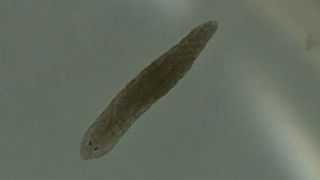
Tiny flatworms found in ponds and rivers could revolutionize the treatment of mental illnesses such as schizophrenia, according to a groundbreaking study conducted by the University of Reading. The research indicates that these planaria worms react to brain medicines in a manner similar to rodents, offering a promising alternative that could reduce ethical concerns associated with animal testing.
Led by Professor Vitaliy Khutoryanskiy, the study suggests that planaria could replace mice and rats in scientific research, potentially decreasing the number of rodents used annually. “This finding is significant for both science and animal welfare,” Prof. Khutoryanskiy stated. “Using planaria could cut down the nearly one million mice and rats used in UK research each year.”
The Role of Planaria in Scientific Research
Planaria have previously been utilized in studies on epilepsy and drug addiction, as these flatworms exhibit withdrawal symptoms similar to those seen in more complex organisms. The recent research, published in the journal Pharmaceutical Research, discovered that planaria become less active when exposed to haloperidol, a drug commonly used to manage mental health conditions.
Haloperidol functions by calming overactive brain activity, a critical component in treating patients whose thoughts are racing or confused. Traditionally, scientists have relied on rodents to test such medicines, but the new findings suggest that planaria could serve as a viable alternative. This shift could lead to the development of more effective treatments for conditions like schizophrenia and hallucinations.
Implications for Mental Health Treatment
The potential use of planaria in research could significantly impact the development of mental health treatments. By providing a simpler and more ethical model for studying brain activity, these worms could help scientists better understand how drugs affect the brain and lead to more targeted therapies for mental health disorders.
The University of Reading has already incorporated this research into its educational programs, using the haloperidol effect on worms as part of its undergraduate pharmacology classes. This integration highlights the growing recognition of planaria’s value in scientific research.
Expert Opinions and Future Directions
According to Prof. Khutoryanskiy, “This finding adds to growing evidence that tiny flatworms like planaria could play a valuable role in how we study the brain.” The potential reduction in the use of rodents aligns with broader ethical considerations in scientific research, offering a more humane approach without compromising the quality of data obtained.
“Close to a million mice and rats are used in UK research each year, but using planaria instead could potentially cut those numbers and still give us the answers we need to develop better treatments for people with serious mental health conditions,” Prof. Khutoryanskiy emphasized.
Historical Context and Ethical Considerations
The use of animals in research has long been a contentious issue, with ethical debates often centered around the welfare of laboratory animals. The introduction of planaria as a research model could mark a turning point in this ongoing discussion, offering a more ethical alternative while maintaining scientific rigor.
Historically, the reliance on rodents has been due to their physiological similarities to humans, but the discovery that planaria can mimic certain neurological responses opens new avenues for research. This development could lead to a paradigm shift in how scientists approach the study of mental health treatments.
As the scientific community continues to explore the capabilities of planaria, the potential for these tiny creatures to contribute to significant advancements in mental health research becomes increasingly apparent. The University of Reading’s study not only highlights the worms’ potential but also underscores the importance of innovative approaches in scientific research.
For more updates on this and other stories, follow us on Facebook, X (Twitter), or Instagram.





